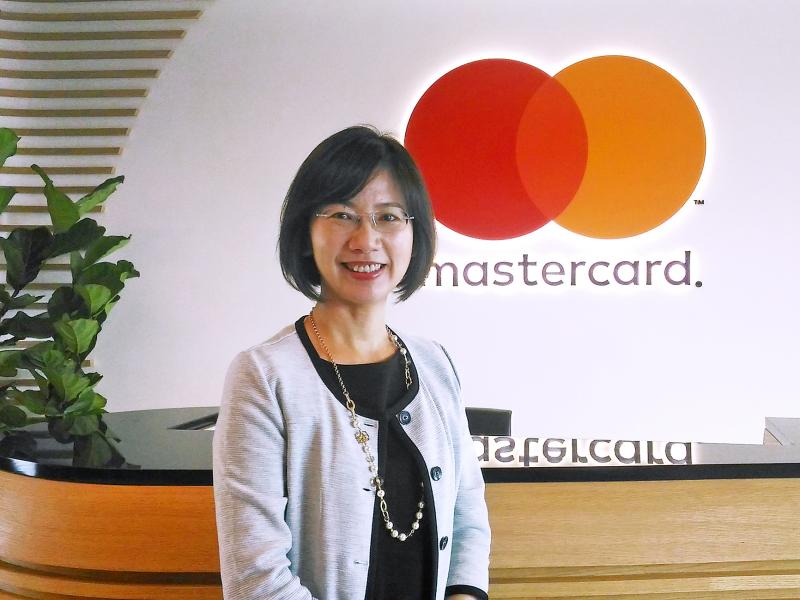Mastercard Taiwan has teamed up with E.Sun Commercial Bank (玉山銀行) to issue what they are calling the nation’s first digital credit card, which can be used at physical stores and on online platforms, the card issuer said yesterday.
Once a consumer’s application for the credit card is approved, the card’s information, such as its number and security code, is sent to E.Sun Bank’s electronic wallet app, MasterCard Taiwan general manager Eva Chen (陳懿文) said in a statement.
Consumers can use the card’s numbers to purchase goods online, or link the card with different mobile payment tools so that they can shop at physical locations with the credit cards, Chen said.

Photo: Lee Chin-hui, Taipei Times
Many local banks provide digital banking services and allow their clients to link credit cards with various types of electronic wallets.
However, the card issued by Mastercard and E.Sun Bank is the first “real digital card,” the companies said.
The issuance of the new card is eco-friendly, as about 900 grams of carbon dioxide emissions are generated by the production of a single card and can be avoided by using the digital card, they added.
The digitial credit card is to offer 0.5 percent cash rewards on regular purchases, and 10 percent rewards on “green purchases,” such as bicycles, scooters or car sharing platforms, E.Sun Bank said.

With an approval rating of just two percent, Peruvian President Dina Boluarte might be the world’s most unpopular leader, according to pollsters. Protests greeted her rise to power 29 months ago, and have marked her entire term — joined by assorted scandals, investigations, controversies and a surge in gang violence. The 63-year-old is the target of a dozen probes, including for her alleged failure to declare gifts of luxury jewels and watches, a scandal inevitably dubbed “Rolexgate.” She is also under the microscope for a two-week undeclared absence for nose surgery — which she insists was medical, not cosmetic — and is

GROWING CONCERN: Some senior Trump administration officials opposed the UAE expansion over fears that another TSMC project could jeopardize its US investment Taiwan Semiconductor Manufacturing Co (TSMC, 台積電) is evaluating building an advanced production facility in the United Arab Emirates (UAE) and has discussed the possibility with officials in US President Donald Trump’s administration, people familiar with the matter said, in a potentially major bet on the Middle East that would only come to fruition with Washington’s approval. The company has had multiple meetings in the past few months with US Special Envoy to the Middle East Steve Witkoff and officials from MGX, an influential investment vehicle overseen by the UAE president’s brother, the people said. The conversations are a continuation of talks that

CAUTIOUS RECOVERY: While the manufacturing sector returned to growth amid the US-China trade truce, firms remain wary as uncertainty clouds the outlook, the CIER said The local manufacturing sector returned to expansion last month, as the official purchasing managers’ index (PMI) rose 2.1 points to 51.0, driven by a temporary easing in US-China trade tensions, the Chung-Hua Institution for Economic Research (CIER, 中華經濟研究院) said yesterday. The PMI gauges the health of the manufacturing industry, with readings above 50 indicating expansion and those below 50 signaling contraction. “Firms are not as pessimistic as they were in April, but they remain far from optimistic,” CIER president Lien Hsien-ming (連賢明) said at a news conference. The full impact of US tariff decisions is unlikely to become clear until later this month

Nintendo Co hopes to match the runaway success of the Switch when its leveled-up new console hits shelves on Thursday, with strong early sales expected despite the gadget’s high price. Featuring a bigger screen and more processing power, the Switch 2 is an upgrade to its predecessor, which has sold 152 million units since launching in 2017 — making it the third-best-selling video game console of all time. However, despite buzz among fans and robust demand for pre-orders, headwinds for Nintendo include uncertainty over US trade tariffs and whether enough people are willing to shell out. The Switch 2 “is priced relatively high”